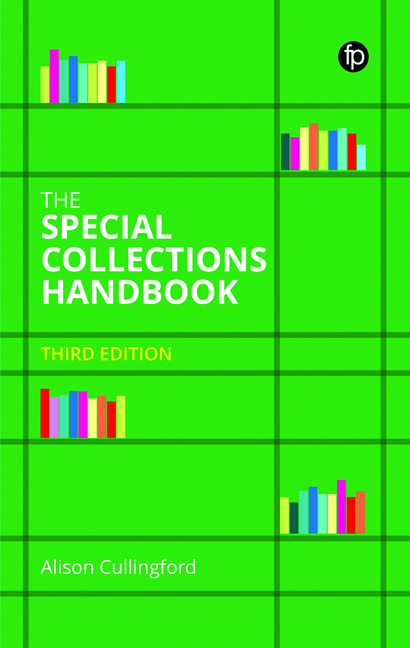Book contents
3 - Emergency Planning for Special Collections
Published online by Cambridge University Press: 28 April 2022
Summary
Introduction
This chapter discusses threats that destroy Special Collections much more quickly than those discussed in Chapter 2. As the timescale for remedial action is so much shorter, prevention, planning and rapid response are essential.
The chapter covers:
1 Causes and impact of emergencies in Special Collections, highlighting risks from fire and water.
2 Preventing and preparing for emergencies.
3 Salvaging wet materials.
4 Preparing for technological incidents.
5 Service continuity and organisational resilience.
6 Emergency response and recovery.
7 Security issues and how to manage them.
8 Insurance and valuation.
9 Suggestions for further reading and useful websites.
To minimise speculation on current and recent emergencies, and out of sensitivity to those affected, I include only historic documented incidents as examples.
A note on terminology
An emergency is ‘any incident which threatens human safety and/or damages or threatens to damage (or destroy) an institution's buildings, collections, contents, facilities or services’ (Matthews and Eden, 1996, cited by Matthews, Smith and Knowles, 2009). Emergency planning seeks to prevent such incidents and to minimise their impact if they occur.
The term ‘disaster’ has traditionally been used by librarians to describe such events. It is not widely used in other professional areas and ‘avoidance of the word “disaster” is seen as more positive’ (Dadson, 2012). The terms crisis or incident may also be encountered.
Emergency planning also needs to consider how to get the service back to normal as quickly as possible. This is known as service continuity or business continuity planning, and (in US government and public settings) continuity of operations (COOP). Organisational resilience refers to an organisation's ability to adapt successfully to change, to recover from setbacks and focus on its purpose and users. It has been particularly resonant during the COVID-19 crisis when organisations faced extraordinary and fast changing circumstances.
Standards and benchmarking
The standards and benchmarks covered in Chapter 2 incorporate these risks, for example, BS EN 16893:2018 (British Standards Institution, 2018) specifies how Special Collections spaces should be set up to prevent and protect from hazards.
Understanding Special Collections emergencies
Special Collections are at risk from emergencies that may harm collections, affect services and put human life and welfare in danger. Emergencies are caused by factors including:
1 Extreme weather conditions: heavy rainfall or other precipitation, hurricanes or tornadoes, resulting in floods or destruction of or damage to buildings.
- Type
- Chapter
- Information
- The Special Collections Handbook , pp. 63 - 84Publisher: FacetPrint publication year: 2022



